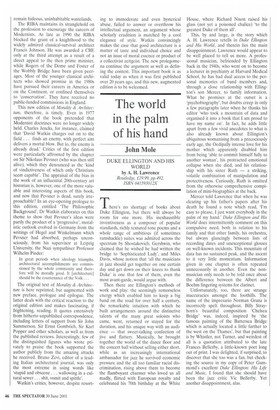The world in the palm of his hand
John Mole
DUKE ELLINGTON AND HIS WORLD by A. H. Lawrence Rout/edge, £19.99, pp.492, ISBN 0415930I2X There's no shortage of books about Duke Ellington, but there will always be room for one more. His inexhaustible inventiveness as a composer of popular standards, richly textured tone poems and a whole range of ambitious (if sometimes ramshackle) suites was admired across the spectrum by Shostakovich, Gershwin, who claimed that he wished he had written the bridge to 'Sophisticated Lady', and Miles Davis, whose notion that 'all the musicians in jazz should get together on one certain day and get down on their knees to thank Duke' is one that few of them, even the most avant-garde, would argue with.
Then there are Ellington's methods of work and play: the seemingly remorseless energy which enabled him to keep a big band on the road for over half a century, the remarkable intuition with which he built arrangements around the distinctive talents of the many great soloists who came, went, returned or stayed for the duration, and his unique way with an audience — that sweet-talking confection of jive and flattery. Musically, he brought together the world of the dance floor and the concert hall without selling either short, while as an increasingly international ambassador for jazz he survived economic pressure and the all too familiar racial discrimination, rising above them to become the flamboyant charmer who loved us all madly, flirted with European royalty and celebrated his 70th birthday at the White House, where Richard Nixon raised his glass (not yet a poisoned chalice) 'to the greatest Duke of them all'.
This, by and large, is the story which A. H. Lawrence retells in Duke Ellington and His World, and therein lies the main disappointment. Lawrence would appear to be well placed to tell us more. A professional musician, befriended by Ellington back in the 1940s, who went on to become a lecturer in psychiatry at Harvard Medical School, he has had dual access to the personal memories of band members and, through a close relationship with Ellington's son Mercer, to family information. What he promises at the outset is a `psychobiography', but doubts creep in only a few paragraphs later when he thanks his editor 'who took a mountain of data and organised it into a book that I am proud to have my name on'. In fact, he adds little apart from a few vivid anecdotes to what is also already known about Ellington's ubiquitous womanising from a precociously early age, the Oedipally intense love for his mother which apparently disabled him from being 'able to commit himself fully to another woman', his protracted emotional collapse when she died, and his relationship with his sister Ruth — a striking, volatile combination of manipulation and protectiveness. Curiously, Ruth is omitted from the otherwise comprehensive compilation of mini-biographies at the back.
Mercer told Lawrence that when he was clearing up his father's papers after his death he found a note which read, 'I'm easy to please, I just want everybody in the palm of my hand.' Duke Ellington and His World does intermittently comment on this compulsive need, both in relation to his family and that other family, his orchestra, but always glancingly between lists of recording dates and unexceptional glosses on well-known incidents. This mountain of data has no sustained peak, and the ascent to it very little momentum. Information given in one chapter is often repeated unnecessarily in another. Even the nonmusician only needs to be told once about the difference between the Albert and Boehm fingering systems for clarinet.
Unfortunately, too, there are strange inaccuracies amongst the foothills. The name of the impresario Norman Granz is incorrectly spelt throughout, Billy Strayhorn's beautiful composition 'Chelsea Bridge' was, indeed, inspired by 'the famous painting of the Battersea Bridge which is actually located a little farther to the west on the Thames', but that painting is by Whistler, not Turner, and weirdest of all is a quotation attributed to the late Frances Bellerby, a little-known poet long out of print. I was delighted, if surprised, to discover that she too was a fan, but checking the source in my copy of Peter Gammond's excellent Duke Ellington: His Life and Music, I found that she should have been the jazz critic Vic Bellerby. Yet another disappointment, alas.










































































 Previous page
Previous page